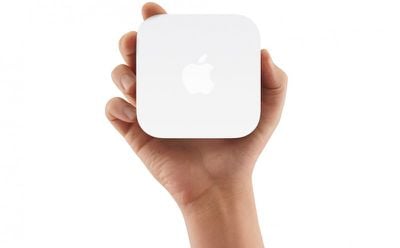Apple today released a new AirPort Base Station Firmware Update for the Airport Express, AirPort Extreme, and AirPort Time Capsule.
According to Apple, the new 7.8.1 update "improves the security of your base station" and is recommend for all Apple 802.11n Wi-Fi Base Stations. This update is for 802.11n Base Stations and not the 802.11ac models, which are already running 7.9.1 firmware.

There are no details on what security fixes are included, but owners of these devices should download and install the update using the AirPort Utility app for iOS devices.
Apple discontinued its entire AirPort wireless router lineup in April 2018 and no longer offers these devices for sale.
Apple promised to continue offering service and parts for AirPort Base stations for the next five years, which includes firmware updates to address security issues.
























Top Rated Comments
seriously though, apple routers are the best i've used.
Either way it wouldn't be a lot of extra electronics or design to go in there.
The answer is that each Apple device is its own piece of a mesh network. Every Apple device recognizes Apple devices around it and seamlessly creates a network of all devices logged into the same Apple ID and known Apple ID's.
The reliability of transferring files via AirDrop has gotten to a point where it really does just work. iCloud puts storage in the cloud where any device can access it, even outside of a traditional local network. Printers connect directly to each device, without having to configure them manually. These functions constitute the majority of uses for a home network.
The obvious piece that's missing is of course internet access. iPhones connect to the internet directly via LTE and can even get other devices online like Macs and iPads. But LTE data is expensive and Macs and AppleTVs consume large amounts of data. This is where 5G will come in. Speeds are expected to exceed terrestrial internet and available bandwidth will enable ISP's to charge the same for wireless data as they do for traditional internet — with the added benefit that it's much cheaper to deploy 5G infrastructure than it is optical cabling under city streets and on poles.
Some people will probably say that this isn't viable for offices. Commercial networks were never AirPort's focus. IT departments didn't buy a bunch of AirPort to build networks. It was always primarily a consumer device. We have to see this from a consumer perspective and so for consumers, a direct internet connection via a 5G chip built into each device makes far more sense than configuring WiFi networks at home.
Mesh networks are experiencing a bit of a moment now but I don't think that will last as 5G is deployed and people start relying on their future iPhone's 5G connection when data prices drop to the price of traditional home internet prices. Apple wasn't looking at the short term when they decided to abandon AirPort. They're thinking ahead. I fully expect Macs and even AppleTV's to come with built in 5G chips in the coming years and for Watches and iPads to come with cellular chips standard.